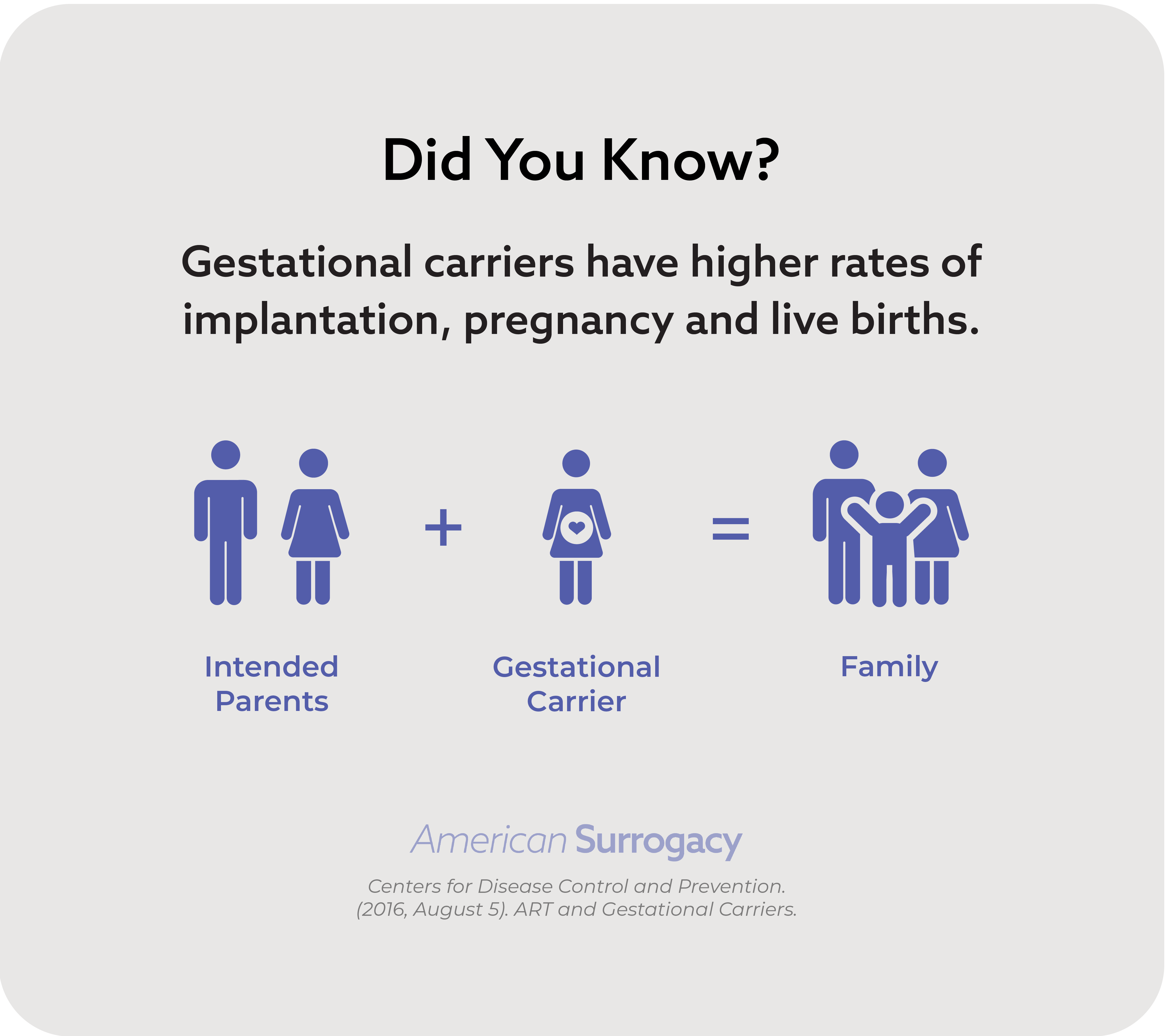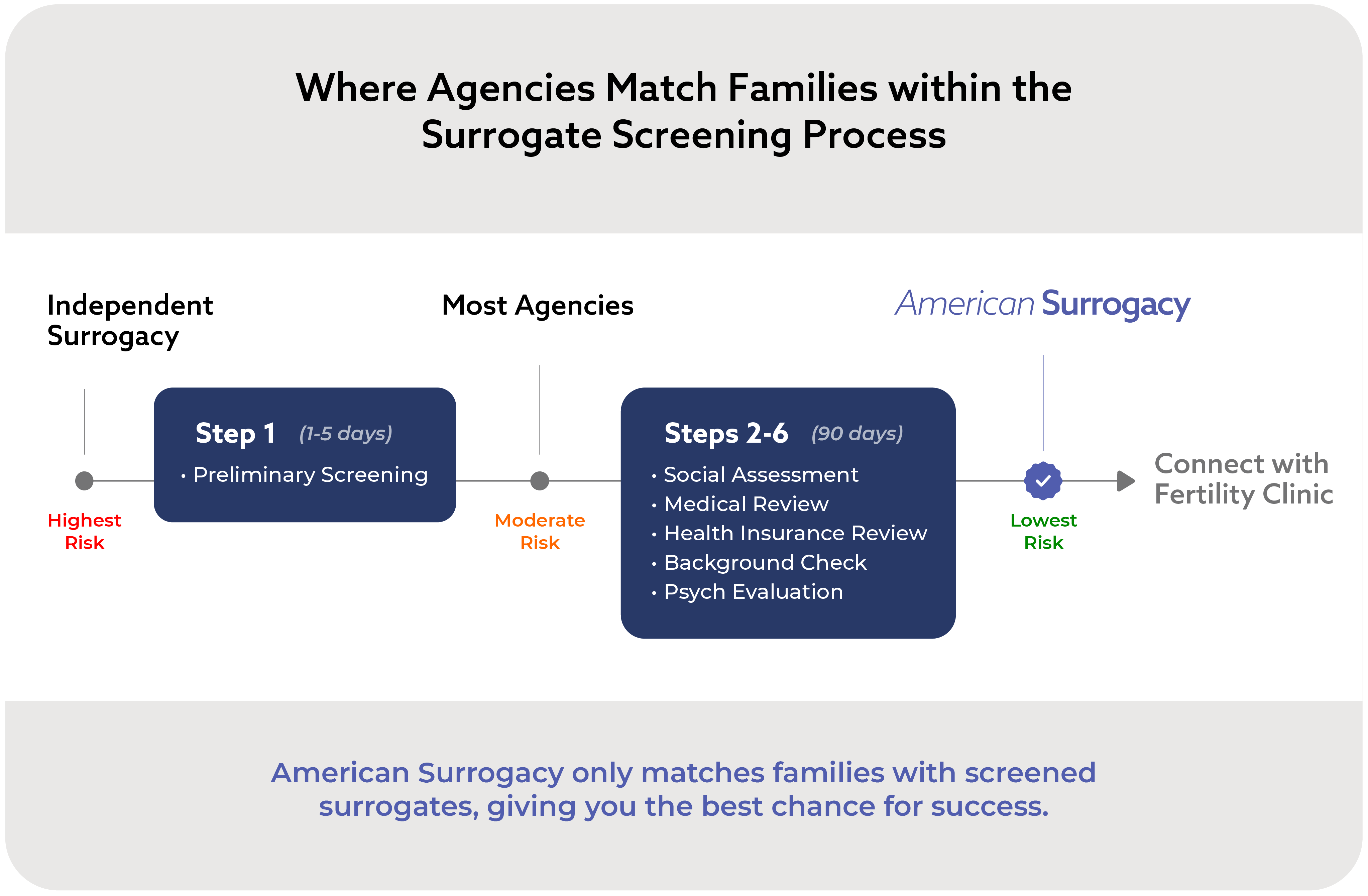If you're considering surrogacy, one of the first questions you might ask is, "Will the surrogate share DNA with our baby?" In gestational surrogacy, the most common form used by agencies like American Surrogacy, the baby is not genetically related to the surrogate.
Instead, the embryo is created using the intended parents' (or donors’) genetic material and carried by a carefully screened gestational carrier.
With the right legal protections in place, you can move forward knowing exactly who your child will be connected to—biologically and legally.
Want to speak to someone about building your family through surrogacy?
In this guide, we'll walk you through the science, clarify common misconceptions and show you exactly how surrogacy agencies like ours ensure genetic clarity, legal certainty and compassionate support at every step.
Does a Surrogate Mother Share DNA with the Baby?
No. In gestational surrogacy, the surrogate mother does not share DNA with the baby. The child is conceived through in vitro fertilization (IVF) using an egg from the intended mother or an egg donor and sperm from the intended father or a donor.
The resulting embryo is transferred into the surrogate's uterus, where she carries the pregnancy to term. Since the egg does not come from the surrogate, there is no genetic relationship between her and the baby.
However, in traditional surrogacy, which is now rare, the surrogate uses her egg—making her the biological mother and establishing a genetic link with the child. This distinction is essential for understanding the role of DNA in different types of surrogacy.

Gestational Surrogacy vs. Traditional: What’s the Difference?
In gestational surrogacy, the surrogate carries an embryo created from the egg and sperm of the intended parents or donors.
Since the surrogate does not provide the egg, she is not genetically related to the baby. This method is widely used today due to its legal clarity and genetic separation.
In contrast, traditional surrogacy involves the surrogate’s own egg, meaning she is both the gestational and genetic mother.
This creates a biological relationship and can introduce legal and emotional complexities. For this reason, traditional surrogacy is rarely practiced today.
Whose DNA Does a Surrogate Baby Have?
In gestational surrogacy, the DNA of the baby comes entirely from the intended parents or selected donors, not the surrogate.
This process uses in IVF to create an embryo outside the body. The embryo is typically formed using the egg from the intended mother (or an egg donor) and sperm from the intended father (or a sperm donor).
Once the embryo is created, it is transferred to the surrogate's uterus, where she carries the pregnancy but contributes no genetic material.
This means the surrogate is not biologically related to the child. She provides the nurturing environment for the baby to grow, but she does not pass on her DNA, even though she is carrying the child.
If you're not able to use your eggs for surrogacy or you're an LGBT couple, learn how to find donor eggs for surrogacy.
Will the Baby Look Like the Surrogate?
No, not in gestational surrogacy. Because the surrogate does not contribute any DNA, the baby’s physical traits such as eye color, hair type, facial features or height come solely from the intended parents or the chosen egg and sperm donors.
That said, some people wonder whether the baby’s time in the surrogate’s womb can somehow influence its appearance or personality.
While the uterine environment does play an important role in the baby’s development (such as supporting growth and health), it does not change or shape the baby’s genetic traits. Features like dimples, freckles or a strong jawline are passed down through DNA not carried over through pregnancy.
This concern often arises from a deeper place—a desire to understand how connected a surrogate is to the child she carries.
At American Surrogacy, we take great care to explain the medical, legal, and emotional boundaries of surrogacy.
In gestational arrangements, the surrogate nurtures the baby, but she is not genetically or legally the parent. This clear separation provides peace of mind for all involved.
Does a Baby Inherit Anything From a Surrogate Mother?
Even in gestational surrogacy, where there is no shared DNA, the surrogate’s body still plays a vital role. The uterine environment influences the baby's growth, health and development through epigenetics—the biological process by which gene expression is affected by the environment.
While these changes do not alter the baby’s DNA, they can influence how certain genes are turned on or off during pregnancy.
This means the surrogate’s lifestyle, health and overall wellness can contribute to the baby’s development, but she remains genetically unrelated to the baby.
Why Thorough Screening Matters Before Matching
Because the surrogate’s body plays such a critical role during pregnancy even without a genetic link, comprehensive screening is one of the most important steps we take at American Surrogacy.
Every prospective surrogate is vetted through extensive medical testing, psychological evaluation, background checks and insurance reviews before they’re ever matched with intended parents.
This proactive approach prevents complications down the line, saving you valuable time, money and stress.
By identifying the most qualified, committed candidates early in the process, we’re able to provide matches that are not only safe and medically sound but also aligned with your hopes for a smooth and supported journey.

How Surrogacy Agencies Ensure Genetic Clarity
One of the most important roles of a surrogacy agency is to ensure that there is no confusion about who the baby belongs to genetically, legally and emotionally.
Beyond medical protocols, surrogacy contracts play a key role in reinforcing these boundaries. These legal agreements, reviewed by independent attorneys, explicitly outline the genetic sources and the intended parents’ rights and responsibilities.
Agencies like ours also facilitate psychological screening and counseling to ensure that every party—especially the surrogate—enters the journey with clear understanding and mutual respect.
This combination of medical documentation, legal clarity, and ethical support ensures that the child born through surrogacy is genetically and legally connected to the intended parents—and that everyone involved is protected and informed.
Take the First Step Toward Parenthood
As soon as your embryos are ready, we’ll help you take the next step with clarity and care. Our team can match you with a thoroughly screened surrogate in an average of 1 - 4 months and guide you through a smooth, supported process.
Connect with American Surrogacy today to learn more.